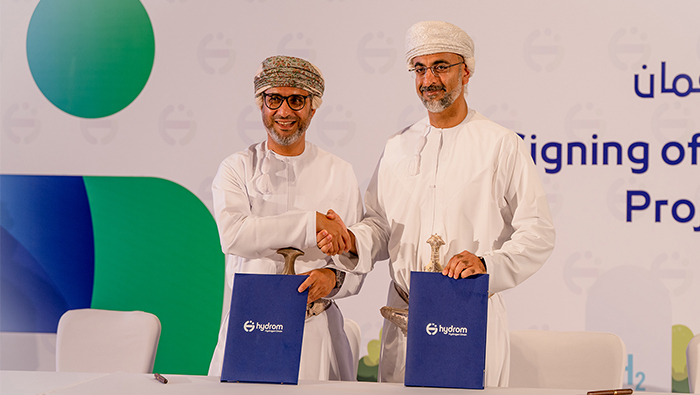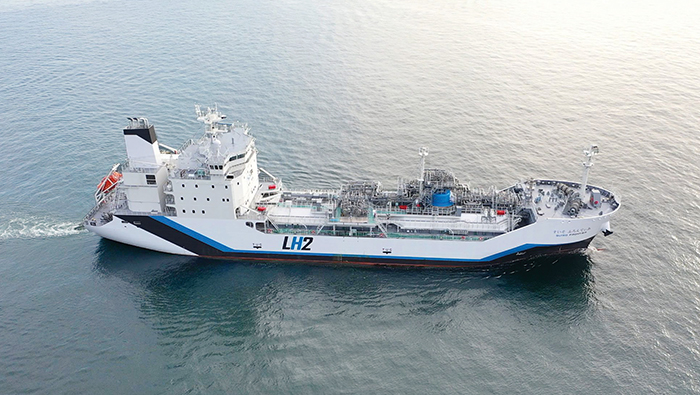

Muscat: The world’s first liquefied hydrogen carrier, Suiso Frontier, will moor at the Sultan Qaboos Port in Muscat on August 14.
According to an official of Kawasaki Heavy Industries (KHI), the manufacturer of the giant Japanese ship, this is the first visit of Suiso Frontier to the Sultanate of Oman. Suiso means hydrogen in Japanese.
Innovative technologies have been used by KHI in building the carrier and with Oman government’s focus on hydrogen production as part of its plans to become global leader in the clean hydrogen production and export sector, the visit assumes significance for the growth of clean energy sector.
The ship-build was completed in 2020, designed and built using the technical knowledge of Kawasaki Heavy Industries, a founding member of the Hydrogen Council.
The ship’s main mission is to introduce Japanese technology that will pave the way for nations to use hydrogen (clean energy), seek cooperation to transport large quantities of hydrogen and to establish global supply chains on a large-scale, fully commercial using it as a preferred carrier.
The ship was built and developed with the support of the Japanese government to transport large quantities of liquefied hydrogen by sea.
It is 116 metres long, 19 metres wide, and carries a double tank with a capacity of 1,250 cubic metres to retain hydrogen and maintain it at a temperature of -253 degrees Celsius. The ship’s arrival comes within the framework of Oman’s consistent efforts to stimulate the green hydrogen economy. Suiso Frontier made a landmark successful shipment and transportation of liquefied hydrogen from Australia to Japan in February 2022.
The 8,000 tonnes ship can transport large quantities of LH2 over long distances by sea.
At the end of January, Australia’s Victoria’s Port of Hastings marked the Suiso Frontier‘s arrival from Japan to Australia. Before that, in December, the world’s first liquid hydrogen carrier left Japan to pick up its first cargo in Australia.
The major milestone in the US$355 million Hydrogen Energy Supply Chain (HESC) project is the first in the world to extract, liquefy and transport LH2 by sea to an international market.
The Suiso Frontier transported the super-cooled LH2 from Port Hastings to Kobe, Japan. The goal was to demonstrate the technical viability of such an international hydrogen supply chain and aim for commercialisation targeting early 2030s. KHI built the first LNG carriers in Japan and Asia in 1981 and has since become a leader in refrigerated technology for marine transportation. More than 40 years later, it built the world’s first liquefied hydrogen carrier, with an upgraded system to contain pressurised refrigerated cargo specifically for LH 2, and a carrier design based on safety requirements approved by the International Maritime Organisation.
Kawasaki’s endeavours in the hydrogen industry started in 2010. By exploiting the synergy of Kawasaki Group technologies, the company is developing technologies and products needed for hydrogen energy supply chain- from production to transportation, storage and utilisation, together with many partner companies.
To stably transport cryogenic liquefied hydrogen, maintaining the temperature during voyage, the cargo tank adopts a vacuum-insulated double-wall structure. The technologies for the high thermal insulation performance are grounded in Kawasaki’s decades-long history in maritime transportation of liquefied natural gas as well as over 30 years of experience in handling cryogenic liquefied hydrogen as rocket fuel.
Hydrogen is an attractive export for countries such as Oman who are aiming for decarbonisation and are committed to Net Zero 20250.
Suiso Frontier’s trip is a significant milestone in the path to the establishment of commercially viable supply chains for the hydrogen market, which is expected to expand in the future.